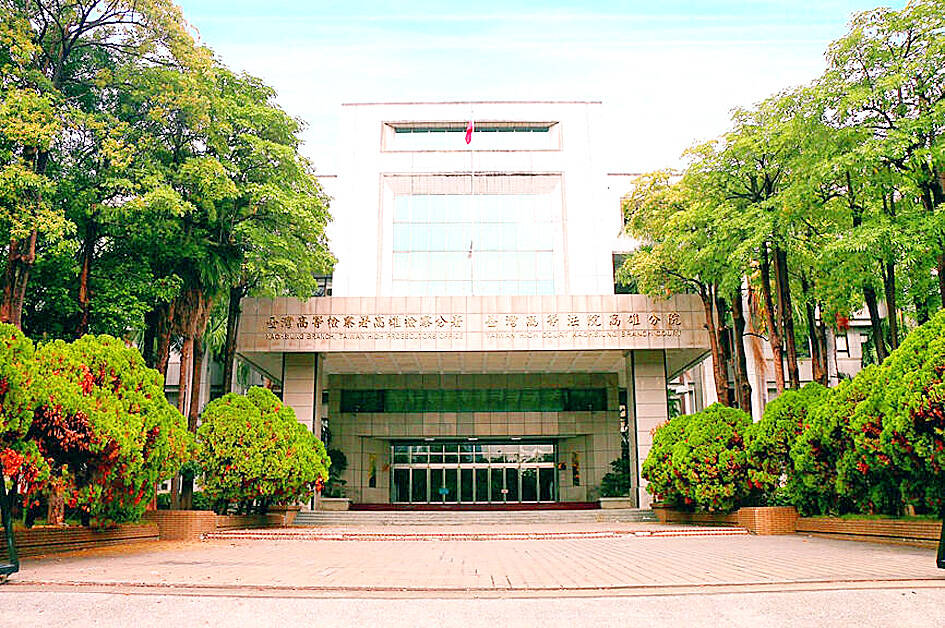Four defendants charged in a national security case for allegedly working for China and infiltrating the military were acquitted yesterday.
The High Court’s Kaohsiung branch handed down not guilty verdicts for retired naval rear admiral Sun Hai-tao (孫海濤), retired army colonel Liu Wan-li (劉萬禮), writer Chu Kang-ming (祝康明) and defendant Kuei Ya-ti (歸亞蒂) on grounds of insufficient evidence.
They were initially indicted on charges of contravening the National Security Act (國家安全法), the Anti-Infiltration Act (反滲透法) and other offenses related to contravening election laws.

Photo: Pao Chien-hsin, Taipei Times
Officials from the High Prosecutors’ Office’s Kaohsiung branch yesterday said they would appeal the ruling.
The four were accused of receiving financial assistance from Beijing, after traveling to China, where they allegedly agreed to work with Chinese officials to develop spy networks in Taiwan.
Prosecutors said the four enticed active and retired military officers to join the network by taking them on junket trips to China and the US, funded and arranged by the Chinese United Front Work Department. They then allegedly recruited officers to form spy networks, obtain classified materials and assist in Chinese propaganda work and “united front” tactics.
Raids were conducted in late 2023, with prosecutors saying that the four received funds from China to purchase gifts, organize banquets, and bribe military personnel and friends to vote for particular election candidates, in contravention of the Presidential and Vice Presidential Election and Recall Act (總統副總統選舉罷免法).
Academics who specialize in legal affairs yesterday said the ruling was a blow to the morale of police and prosecutors, adding that it was tantamount to encouraging proxies of the Chinese Communist Party.
Lo Cheng-chung (羅承宗), a professor at the National Kaohsiung University of Science and Technology’s Graduate Institute of Science and Technology Law, said that while the system requires judges to take national security classes, the ruling demonstrated there still exists a lack of awareness regarding national security threats among judges.
Additional reporting by Chen Yu-fu

The manufacture of the remaining 28 M1A2T Abrams tanks Taiwan purchased from the US has recently been completed, and they are expected to be delivered within the next one to two months, a source said yesterday. The Ministry of National Defense is arranging cargo ships to transport the tanks to Taiwan as soon as possible, said the source, who is familiar with the matter. The estimated arrival time ranges from late this month to early next month, the source said. The 28 Abrams tanks make up the third and final batch of a total of 108 tanks, valued at about NT$40.5 billion

Two Taiwanese prosecutors were questioned by Chinese security personnel at their hotel during a trip to China’s Henan Province this month, the Mainland Affairs Council (MAC) said yesterday. The officers had personal information on the prosecutors, including “when they were assigned to their posts, their work locations and job titles,” MAC Deputy Minister and spokesman Liang Wen-chieh (梁文傑) said. On top of asking about their agencies and positions, the officers also questioned the prosecutors about the Cross-Strait Joint Crime-Fighting and Judicial Mutual Assistance Agreement, a pact that serves as the framework for Taiwan-China cooperation on combating crime and providing judicial assistance, Liang

A group from the Taiwanese Designers in Australia association yesterday represented Taiwan at the Midsumma Pride March in Melbourne. The march, held in the St. Kilda suburb, is the city’s largest LGBTQIA+ parade and the flagship event of the annual Midsumma Festival. It attracted more than 45,000 spectators who supported the 400 groups and 10,000 marchers that participated this year, the association said. Taiwanese Designers said they organized a team to march for Taiwan this year, joining politicians, government agencies, professionals and community organizations in showing support for LGBTQIA+ people and diverse communities. As the first country in Asia to legalize same-sex

MOTIVES QUESTIONED The PLA considers Xi’s policies toward Taiwan to be driven by personal considerations rather than military assessment, the Epoch Times reports Chinese President Xi Jinping’s (習近平) latest purge of the Chinese People’s Liberation Army (PLA) leadership might have been prompted by the military’s opposition to plans of invading Taiwan, the Epoch Times said. The Chinese military opposes waging war against Taiwan by a large consensus, putting it at odds with Xi’s vision, the Falun Gong-affiliated daily said in a report on Thursday, citing anonymous sources with insight into the PLA’s inner workings. The opposition is not the opinion of a few generals, but a widely shared view among the PLA cadre, the Epoch Times cited them as saying. “Chinese forces know full well that